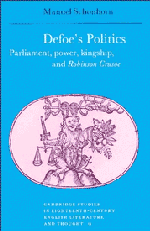Book contents
- Frontmatter
- Contents
- Dedication
- Preface and acknowledgments
- A note on attributions
- List of abbreviations
- Introduction
- 1 Defoe, dissent, and monarchy
- 2 Defoe's Reflections Upon the Late Great Revolution and the political languages of 1689
- 3 Defender of the king, 1689–1701
- 4 From the death of William III to Jure Divino, 1702–1706
- 5 Jure Divino
- 6 The politics of Robinson Crusoe
- Select bibliography
- Index
3 - Defender of the king, 1689–1701
Published online by Cambridge University Press: 19 August 2009
- Frontmatter
- Contents
- Dedication
- Preface and acknowledgments
- A note on attributions
- List of abbreviations
- Introduction
- 1 Defoe, dissent, and monarchy
- 2 Defoe's Reflections Upon the Late Great Revolution and the political languages of 1689
- 3 Defender of the king, 1689–1701
- 4 From the death of William III to Jure Divino, 1702–1706
- 5 Jure Divino
- 6 The politics of Robinson Crusoe
- Select bibliography
- Index
Summary
The determination of Defoe's political stance during the years he was engaged as a government pamphleteer for William III is problematic because of his extensive resort to personae, aliases, and satiric voices, and the vexing problem of attribution. In addition, any secure judgment is rendered more difficult because it intrudes upon the larger and more contentious historical debate about the nature, extent, and consequences of the English Revolution of 1689. In what sense was it a revolution? Was there a significant shift in the balance of power between crown and parliament? If, as G. R. Elton maintains, “the royalist revolution came to grief in 1688,” was 1689 the onset of a parliamentary revolution that decisively rearranged the political system that had governed England for almost two centuries? Was the central characteristic of the Revolution the substitution of divine hereditary right by a temporarily elective monarchy? Or was the Revolution, as the citizens of London and the country wished to believe, a restoration of the balanced constitution that had protected the liberty and property of all Englishmen, a return to the original and ancient form of government?
The assured convictions of Macaulay and the Whig historiographic tradition, that saw events solely as progressive steps to parliamentary democracy, led to the inevitable generational reaction. Twentieth-century re-evaluations of England's bloodless and respectable revolution stressed the sovereign's independence and argued that no new limitations were imposed upon the monarchy at the accession of William and Mary.
- Type
- Chapter
- Information
- Defoe's PoliticsParliament, Power, Kingship and 'Robinson Crusoe', pp. 43 - 88Publisher: Cambridge University PressPrint publication year: 1991

